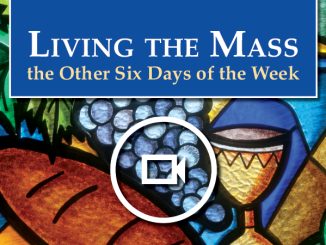
When my daughter Catherine was in elementary school, we developed a school drop-off and pick-up ritual. Before leaving the car, I’d look lovingly into her eyes, smile, and trace the sign of the cross on her forehead, saying, “Blessings upon your day!” When I’d pick her up from the after-school care program at the end of the day, she’d often be playing with friends at the farthest corner of the school yard. The playground supervisor would greet me, turn to where my daughter was, and call at the top of his voice, “CATHERINE!” My daughter would stop whatever she was doing, turn to where I was, run toward me as fast as her legs could carry her, jump into my arms, and wrap me in a big hug.
She eventually grew too big to jump into my arms, but the blessing ritual continued, and the warm, enveloping hugs remain even to this day. As she matured, we’d talk about how these rituals are more than just something we do; they are a form of remembering that continually reinforces and shapes our relationship with each other and with Jesus.
The word anamnesis means “to remember.” It is not simply recalling a profound moment in history. It is meant to be formative and essential to our identity and understanding of who we are as Christians. Through anamnesis, we actively enter the Paschal Mystery: Jesus’ Passion, Death, glorious Resurrection, and Ascension into heaven. We recall our need to be ready for the moment of his Second Coming.
At every Mass, anamnesis is ritualized in the Eucharistic prayers as, with the priest, we remember Jesus’ words at the Last Supper, “Do this in memory of me.”
Invite parents to think about a favorite family ritual, and ask:
- In what ways does it form our children’s identity and understanding as a family member?
- What is our process of helping our children to remember and connect this ritual to who we are as Christians (anamnesis)?
- How does the practice of remembrance and connectedness help our children relate to our family ritual of attending Mass and remembering in the Eucharist?
When I prepared my daughter for Mass in her younger years, I would remind her that this act of worship was our most important family ritual. In the same way that I would bless her each morning, God blesses us with grace each day. In the same way my daughter would hear her name called across the playground, God calls us to worship. And our response as God’s children is to run toward and wrap our arms lovingly around him, joyful in his Real Presence!
God is indeed present and at work in our family lives. Let’s take every opportunity to participate in Christian anamnesis by connecting every loving family ritual to Jesus, the One who shapes our identity and understanding of who we are.
The National Eucharistic Revival provides a great opportunity for catechesis on the Eucharist. Find articles, videos, and activities that aim to help.





Be the first to comment